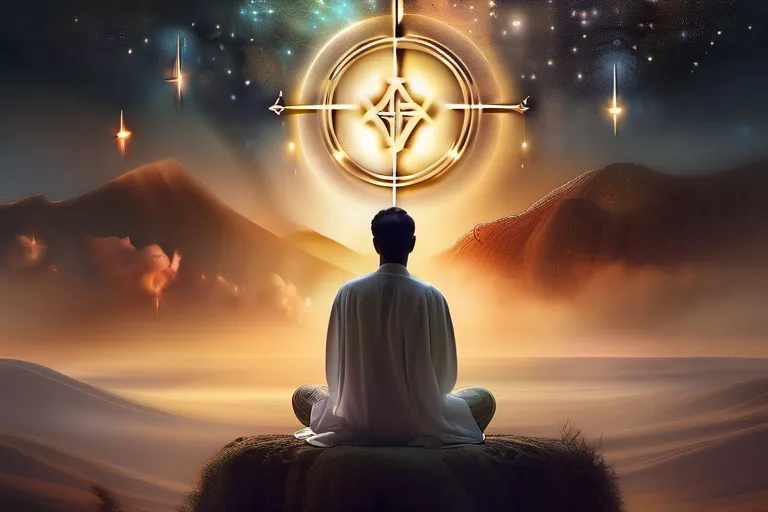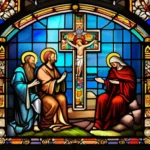Explore the spiritual significance, interpretations, and cultural impact of dreams across various religions.
Dreams have long been a subject of fascination and mystery. In many cultures, they are seen as windows to the divine or messages from the spirit world. This article delves into the role of dreams in religion, exploring their spiritual significance, interpretations, and cultural impact across various religions.
The Role of Dreams in Ancient Religions
Imagine ancient Egypt, where dreams were considered divine messages from the gods themselves. The pharaohs would consult priests and seers to interpret their nightly visions, believing that every dream held a profound meaning. These interpretations often dictated crucial decisions for the kingdom’s future, much like navigating through a labyrinth with the guidance of a map.Could it be that dreams were more than just sleep-induced fantasies?
In ancient Greece, dreams played an equally significant role in religious life. The Oracle of Delphi was sought out by people from all walks of life who wanted to understand their futures or seek divine approval for important matters. Dreams were seen as a form of prophecy, with certain deities like Morpheus, the god of sleep and dreams, playing key roles. How could these nightly visions shape entire civilizations?
Rome, too, had its own beliefs about the spiritual significance of dreams. The Romans believed in somnambulism, where individuals acted out their dreams while asleep. These actions were often seen as messages from the gods or a sign of divine favor. During times of crisis, it was common for citizens to seek guidance through divination and dream interpretation, much like seeking a compass in the midst of a tempestuous sea.What lessons can we learn about the interconnectedness of dreams and spirituality?
These ancient cultures viewed dreams not merely as personal experiences but as channels for divine communication. They were woven into the fabric of daily life, influencing political decisions, personal beliefs, and societal norms. The role of dreams in these religions was both intimate and expansive, reflecting the spiritual landscape of their societies.
Dreams in Abrahamic Religions
The role of dreams in Abrahamic religions—Judaism, Christianity, and Islam—is profound and multifaceted. Can we really understand these faiths without delving into their dreamscapes? In the Hebrew Bible, dreams are a powerful medium through which divine messages are conveyed. For instance, consider Joseph’s vivid dreams that predict his future as a leader in Egypt. How did those visions shape not just his life but the course of history? The same could be said about the dreams of Jacob and Laban, where the patriarch’s nocturnal experiences play pivotal roles in his journey.
In Christianity, dreams also hold significant spiritual weight. Think of the Biblical account of Daniel’s interpretation of the king’s dream. How did this event transform not just Daniel but the entire kingdom? The Book of Revelation, filled with symbolic and apocalyptic visions, is a testament to the prophetic power of dreams in Christian lore. Moreover, Jesus himself is said to have had visions that guided his path, making dreams a crucial part of his ministry.
Moving to Islam, the Holy Prophet Muhammad’s life is deeply intertwined with dreams. The Quran itself mentions dreams as a means of guidance and revelation. One famous example is the dream from which the Fatiha (the opening chapter of the Quran) was revealed. This highlights how dreams were a continuous source of divine communication in his prophetic mission.
The impact of these dream experiences extends far beyond their initial occurrences. They shape religious texts, guide individual and communal behavior, and even influence political landscapes. In what ways do you think these dreams have shaped the world we live in today? Could they offer us insights into the divine will and human destiny?
Shamanism and Dreams
In shamanism, dreams are seen as gateways to the spiritual realms, much like keys unlocking hidden treasures within oneself. How do shamans view these nocturnal visits? Are they just random occurrences or profound messages from the divine? Shamans believe that dreams serve a dual purpose: healing and divination. Through dreams, they gain insights into the well-being of individuals and communities, as if peering into a crystal ball.
Shamans often use dreams to diagnose illnesses and suggest remedies. It’s like having an internal map guiding them through the body’s ailments. By interpreting these dreams, shamans can pinpoint the source of distress, whether it be physical or emotional. This practice not only aids in healing but also strengthens the bond between shaman and community.
But dreams aren’t just about fixing what’s wrong; they are also a path to spiritual growth. Shamans use dreams to connect with ancestors and spirits, seeking guidance for themselves and their people. It’s as if entering a sacred library where ancient wisdom resides. Through these dream journeys, shamans can uncover solutions to pressing issues, offering new perspectives that enrich both their personal lives and the collective spirit of their community.
How do you see dreams playing a role in your life? Do they offer guidance or simply echo our waking thoughts? In shamanism, dreams are not just visions but vital tools for navigating the complex web of existence. They provide a window into the spiritual realm, helping shamans and their communities find balance and harmony.
Dream Interpretation in Religion
Have you ever woken up, wide-eyed and questioning the significance of your dreams? In many religious traditions, these nocturnal visions are not merely whimsical wanderings of the mind but profound messages from the divine. Let’s delve into how various religions approach dream interpretation and what they believe about their spiritual importance.
In Genesis, for instance, Joseph interprets Pharaoh’s dreams to save Egypt during a time of famine. This biblical account illustrates how dreams can be seen as prophetic tools, foretelling future events or guiding individuals towards important decisions. In Judaism, the dream visions of Jacob and Laban are similarly revered, suggesting that these experiences hold significant meaning.
Across Hinduism, dreams are viewed through the lens of yoga and meditation practices. According to Hindu scriptures, there are three states of consciousness: waking, dreaming, and deep sleep. Dreams here are seen as a bridge between waking life and the transcendent state, providing insight into one’s spiritual progress. The Bhagavad Gita emphasizes the importance of discerning true knowledge from ignorance in dreams, teaching practitioners to interpret their visions with wisdom.
In Islam, dreams hold great significance and are often seen as a form of divine communication. The Prophet Muhammad himself was said to receive revelations through his nightly dreams, which were later compiled into the Quran. Islamic scholars encourage Muslims to record and reflect on their dreams, seeking guidance from them for both personal and communal matters.
Interestingly, in Taoism, dreams are seen as a manifestation of the subconscious mind, reflecting one’s innermost desires and fears. Taoist practitioners believe that by understanding these dreams, individuals can achieve greater harmony with nature and their own essence. The concept of yin yang is often applied to dream interpretation, highlighting the balance between opposing forces within oneself.
Across different religions, the methods of interpreting dreams vary widely, from seeking divine guidance in religious texts to using symbolic meanings associated with common dreams. Whether through prophetic visions or personal revelations, dreams continue to play a vital role in spiritual practices, offering profound insights into one’s journey towards enlightenment and understanding.
The Role of Dreams in Modern Spirituality
The Role of Dreams in Modern Spirituality: Explore how dreams are used in modern spiritual practices, such as New Age movements and meditation. Have you ever wondered about the deeper meaning behind your nightly visions? In today’s world, where technology often dominates our lives, there is a growing interest in reconnecting with the mystical realm of dreams.
How do dreams fit into contemporary spirituality?
In modern times, many people turn to meditation and mindfulness practices as a way to explore their inner worlds. Dreams become a valuable tool for self-discovery, acting like a mirror reflecting our deepest thoughts and emotions. ‘Can we truly understand ourselves without first understanding the voices of our subconscious?’ asks Dr. Lisa Martinez, a renowned psychologist specializing in dream analysis.
Dreams in modern spirituality often serve as pathways to personal growth. They provide insights into our fears, desires, and hidden motivations. Many practitioners believe that by delving into their dreams, they can uncover aspects of themselves that remain unnoticed during waking hours. This process is akin to peeling back the layers of an onion, revealing the core of one’s being.
The New Age movement, in particular, places a significant emphasis on dream work. They see dreams as gateways to other dimensions and spiritual realms. Through guided meditation and journaling, individuals can explore these experiences more deeply, integrating them into their daily lives for greater balance and harmony.
How do you approach interpreting your own dreams?
By embracing the symbolic language of dreams, we can gain profound insights that may not be accessible through conventional means. Whether it’s seeing a beloved pet in your dream or witnessing an abstract scene, these symbols often hold personal significance and can guide us towards making positive changes.
So, how do you see yourself integrating dreams into your spiritual practice? Are you ready to embark on this journey of self-discovery through the world of your subconscious?
The Science Behind Dreams and Religion
The science behind dreams and religion intertwines like a delicate thread woven through the tapestry of human belief. Have you ever wondered why dreams often seem to mirror our deepest spiritual questions? Could it be that these nightly visions hold keys to unlocking our most profound religious insights?
From ancient times, humans have puzzled over the nature of dreams and their significance in the realm of religion. Is there a scientific explanation for why we dream, or do our nighttime fantasies hold sacred truths waiting to be deciphered? Some scientists argue that dreams are mere byproducts of brain activity during sleep, a necessary reset for cognitive processes. Yet, many spiritual leaders and believers see dreams as divine messengers, revealing the will of the gods.
The debate between these two perspectives is ongoing, much like the eternal dance of day and night. Are our dreams nothing more than random neural firings or are they windows into a higher realm, whispering secrets of the divine? The answer may lie somewhere in between, where science meets mysticism, painting a picture far richer than either can provide alone.
Consider how religions across the globe incorporate dreams as a vital part of their spiritual practices. In many traditions, prophetic dreams are seen as direct messages from the divine, guiding believers through life’s challenges and offering glimpses into the future. How do you reconcile these beliefs with the idea that your nightly visions are simply products of your subconscious mind?
Perhaps it is in the blending of science and spirituality where we find a deeper understanding. Dreams could be both a window to our inner selves and a means through which the divine communicates, offering insights into personal growth and collective wisdom. The key may lie in how we interpret these visions, turning them from mere brain activity into profound revelations.
Conclusion
 Understanding the role of dreams in religion can provide valuable insights into the beliefs and practices of different cultures. By examining the ways in which dreams are interpreted and used in religious contexts, we gain a deeper appreciation for the rich tapestry of human spirituality.
Understanding the role of dreams in religion can provide valuable insights into the beliefs and practices of different cultures. By examining the ways in which dreams are interpreted and used in religious contexts, we gain a deeper appreciation for the rich tapestry of human spirituality.











